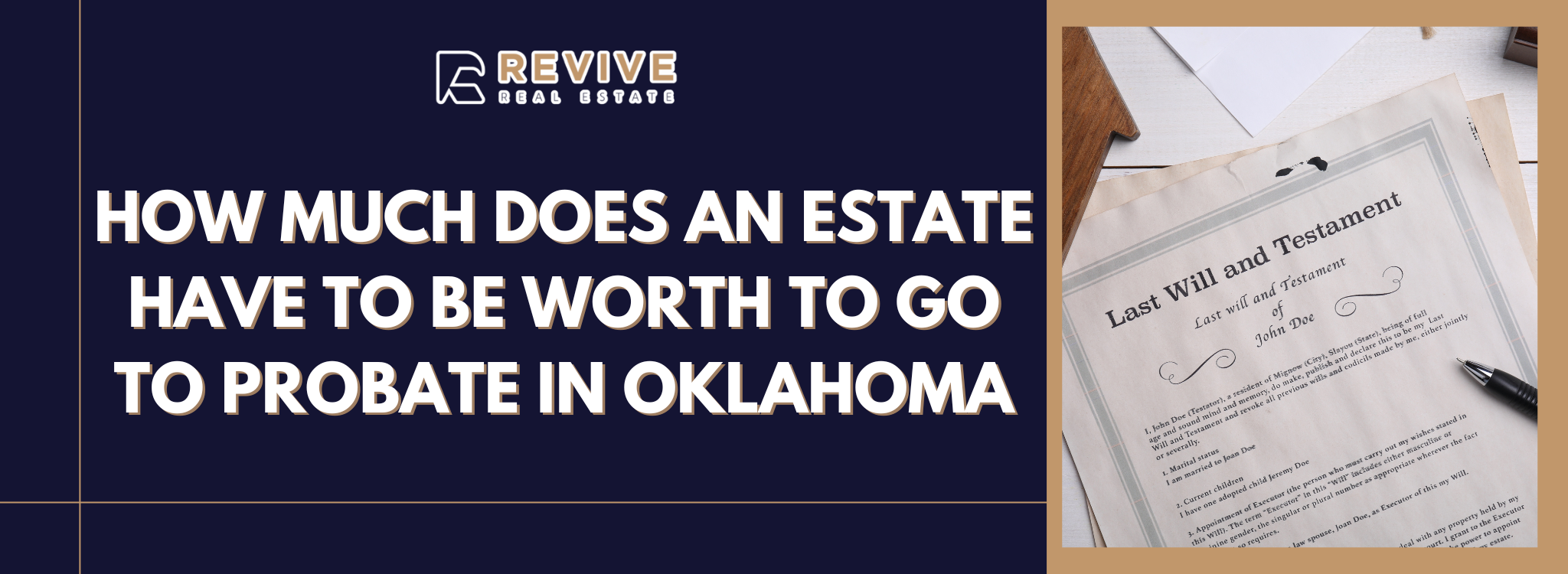
How Much Does an Estate Have to Be Worth to Go to Probate in Oklahoma?
What Determines Whether an Estate Needs Probate?
In Oklahoma, the need for probate depends on asset size and type. Probate is the legal process that manages a deceased person’s estate—paying debts and distributing assets per their will or state law. Under Oklahoma probate laws, estates with real property or substantial financial assets often require probate. Recent changes in Oklahoma law may influence when probate is necessary, especially for smaller estates.

Is There a Minimum Value for Probate in Oklahoma?
Oklahoma law sets thresholds to determine if probate is required. If an estate’s total value is below about $50,000, it might qualify for a simplified process called a “small estate affidavit.” This exception lets heirs avoid full probate court, making the process easier. However, this threshold comes with specific conditions and exemptions. Consulting a probate attorney can help you understand these details clearly.
How Does the Value of Assets Affect the Probate Process?
The value of an estate greatly influences the probate process in Oklahoma. High-value estates usually require thorough probate administration, including detailed estate valuation and possibly higher probate fees. Lower-value estates might be eligible for simpler processes, which can make asset distribution easier. Understanding how asset valuation affects probate helps in effective estate planning. It’s essential to know how assets are distributed and managed through probate to navigate this legal area efficiently.
For expert advice on estate planning and understanding Oklahoma probate laws, contact Revive Real Estate, LLC. We provide consultation to ensure your estate matters are handled with care.
Avoiding Probate in Oklahoma

Can Estates Be Transferred Without Probate?
In Oklahoma, transferring estates without probate is possible and often desirable due to the complicated nature of probate. One way to achieve this is through “transfer on death” deeds for real estate. Additionally, non-probate assets like retirement accounts and life insurance policies with designated beneficiaries can be transferred directly. Some properties are eligible for probate exemptions in Oklahoma, making asset transfers simpler.
What Are the Options to Bypass Probate?
Several strategies can help you bypass probate in Oklahoma:
- Trusts: Creating a living trust lets you transfer assets to beneficiaries without involving the probate court.
- Transfer on Death Deeds: This approach allows you to name a beneficiary who will automatically inherit property upon your passing, skipping the probate process.
- Joint Ownership: Owning property jointly with rights of survivorship ensures it passes directly to the other owner, avoiding probate altogether.
These methods can help you avoid probate in Oklahoma, ensuring a smoother distribution of your estate.

Are There Any Exemptions for Small Estates?
Oklahoma offers exemptions for small estates to simplify the probate process. If an estate’s value is below a specific threshold, it might qualify for a “small estate affidavit.” This legal document allows heirs to claim their inheritance without going through formal probate. The minimum estate value for this affidavit in Oklahoma is relatively low, making it an appealing option for many families.
Using a small estate affidavit can speed up the probate process in Oklahoma, reducing both time and effort for beneficiaries. Consulting with a legal professional can help you understand all probate exemptions available in Oklahoma and decide the best course of action for your situation.
For more detailed information on estate planning or further inquiries, feel free to contact Revive Real Estate, LLC.
Understanding the Costs Involved in Probate

What Are the Typical Fees for Probate in Oklahoma?
When dealing with probate in Oklahoma, knowing the costs involved is important. You will encounter probate fees, which are the court charges for handling the estate. Additionally, there are legal fees for hiring an attorney, which can vary based on the case’s complexity and the lawyer’s experience. The probate court may also charge administrative fees. Generally, attorney fees and costs related to probate administration make up a large part of Oklahoma probate costs. It’s wise to consult a professional for a detailed estimate tailored to your situation.
Are There Additional Expenses Involved in the Probate Process?
Besides standard fees, you might face additional expenses during probate in Oklahoma. These could include charges for legal services beyond routine tasks, like resolving disputes or managing complex assets. Expenses from the Oklahoma probate court might involve court filing fees, publication costs for public notices, and appraisal fees for estate assets. You might also encounter other costs related to estate settlement in Oklahoma, such as taxes or debts owed by the deceased. Knowing these possible expenses can help with effective planning and budgeting.

How Can Probate Costs Be Minimized?
Minimizing probate costs involves strategic planning. Simplifying the probate procedure through careful estate planning, such as setting up trusts, can limit the need for probate. Understanding the legal framework and potential probate exemptions in Oklahoma can also reduce expenses. Working with a knowledgeable attorney through the legal process helps ensure all cost-cutting opportunities are used. Consulting legal professionals about strategies to minimize probate costs is an invaluable step in effective estate management.
The Role of Executors and Beneficiaries

What Are the Responsibilities of an Executor?
An executor, also known as a personal representative in places like Oklahoma, is vital in probate administration. The executor’s responsibilities include managing the deceased’s estate, distributing assets to beneficiaries, settling debts, and fulfilling legal requirements. In Oklahoma, specific executor duties include:
- Starting the Probate Process: Filing necessary documents with the probate court to initiate probate proceedings.
- Inventorying the Estate: Creating a list of the deceased’s assets and liabilities.
- Managing Estate Assets: Safeguarding and managing the estate’s assets during probate.
- Settling Debts and Taxes: Paying off debts and taxes owed by the estate, including any inheritance tax implications.
- Distributing Assets: Following the will’s instructions or state law if there is no will, to distribute assets to heirs.
These tasks require responsibility, and executors must adhere to the will and legal guidelines.
How Do Beneficiaries Receive Their Inheritance?

Beneficiaries receive their inheritance after the probate court approves the distribution plan from the executor. This process can vary based on regional laws, such as those in Oklahoma. Here is how it typically unfolds:
- Initiating Probate Proceedings: The executor begins the probate process to validate the will.
- Notifying Beneficiaries: Beneficiaries are informed about the proceedings and their rights.
- Evaluating the Estate and Settling Debts: The executor assesses the estate’s value and settles any claims.
- Seeking Court Approval for Distribution: After settling debts and taxes, including any inheritance tax, the executor seeks court approval for asset distribution.
- Distributing Assets: Once approved, assets are distributed according to the will or state law.
Understanding beneficiary rights and the estate distribution framework helps ensure smooth inheritance transfer.
Can Executors Be Compensated for Their Duties?

Executors often invest a lot of time in managing an estate and are entitled to compensation for their work. In Oklahoma, executor compensation generally includes:
- Executor Fees: Fees may be specified in the will or determined by state law, reflecting the estate’s complexity and size.
- Reimbursement for Expenses: Executors can claim reimbursement for reasonable expenses during estate management.
- Court-Approved Fees: Sometimes, the probate court must approve executor compensation, especially if beneficiaries contest it.
Understanding probate fees and executor compensation helps ensure fairness and transparency for both executors and beneficiaries.
Legal Assistance and Resources for Probate in Oklahoma
When Should You Consult a Probate Attorney?
The probate process in Oklahoma can be complex, requiring a solid grasp of probate law. It’s wise to consult a probate attorney when managing probate procedures to ensure the legal process is done correctly. A probate attorney in Oklahoma offers help with:
- Understanding the details of probate court procedures.
- Providing information on attorney fees and affordable legal services.
- Ensuring compliance with state probate laws.
Consulting a probate attorney helps make the probate process smoother and avoids costly errors.
What Resources Are Available for Estate Planning in Oklahoma?
Estate planning is essential for managing your assets and ensuring they are distributed according to your wishes. In Oklahoma, there are several resources to assist in creating effective estate plans:
- Wills and Trusts: Setting up a will or trust can help avoid probate and make estate settlement easier.
- Probate Exemptions: Learning about probate exemptions in Oklahoma can reduce legal challenges.
- Educational Materials: Many books and online resources explain probate laws in Oklahoma and offer estate planning advice.
These resources help individuals create an estate plan that aligns with their wishes while meeting local laws.
Where Can One Find Additional Help and Guidance?
For those needing further assistance with probate administration in Oklahoma, consider these options:
- Oklahoma Bar Association: This is a reliable source for finding qualified probate attorneys and provides extensive information.
- Consultation Services: Schedule a consultation with a legal expert to receive personalized guidance.
- Probate Checklist: Use a probate checklist to organize tasks related to estate settlement and probate court proceedings in Oklahoma.
Revive Real Estate, LLC encourages individuals to seek professional advice and explore these resources for navigating the probate process effectively. For more information or to consult with a probate attorney, please contact us directly.
FAQs:
What are the probate requirements in Oklahoma?
In Oklahoma, probate is typically required if an estate’s value exceeds $50,000. Exceptions exist for assets held in trust or with designated beneficiaries. It’s advisable to consult a probate lawyer to understand your specific situation.
How long does the probate process take in Oklahoma, and what factors influence the timeline?
The probate process in Oklahoma usually lasts six months to a year, influenced by factors such as estate complexity, disputes among heirs, and court scheduling. Proper planning and having necessary documents ready can expedite the process.
Can an estate avoid probate in Oklahoma, and if so, how?
Yes, you can bypass probate in Oklahoma by using living trusts, jointly owning properties, or naming payable-on-death (POD) beneficiaries on accounts. These measures ensure assets transfer directly to beneficiaries without probate.
What role does a probate judge play in Oklahoma’s probate process?
A probate judge oversees the legal proceedings for distributing an estate’s assets. They ensure debts and taxes are paid and distribute remaining assets according to the will or state laws if no will exists.
Are there estate tax implications during probate in Oklahoma?
Oklahoma does not have an estate tax, but federal estate taxes may be applicable if the estate’s value exceeds the federal threshold. Consulting a tax advisor can clarify any tax responsibilities.
What is the homestead exemption during probate in Oklahoma?
The homestead exemption protects a primary residence from being used to settle the deceased’s debts during probate. This ensures the surviving spouse or minor children can retain the home despite outstanding debts.
What is summary administration, and when is it applicable in Oklahoma probate?
Summary administration is a simplified probate process for smaller estates or those with few creditors. It offers a quicker, cost-effective way to manage an estate in Oklahoma if specific conditions are met.
Who is responsible for managing an estate in probate in Oklahoma?
An executor, or personal representative, manages an estate during probate. Named in the will, this person is responsible for settling debts, filing paperwork, and distributing assets to heirs.
Key Insights
- In Oklahoma, understanding the minimum estate value for probate is essential. Estates that bypass probate can be settled more efficiently through designated beneficiaries or jointly owned assets.
- Estate taxes and Oklahoma probate requirements differ, impacting how estate funds are distributed, especially with real estate probate or mobile homes.
- Probate costs and processes in Oklahoma, including filing timelines and court proceedings, often raise questions about creditor claims and the statute of limitations. Consulting a probate lawyer can help manage these complexities.
- Clarifying probate myths and legal procedures is important, particularly in Oklahoma County or Oklahoma City, where local laws like community property laws or dower rights can affect estate planning.
- Understanding guardianship, sibling inheritance, and next-of-kin laws in Oklahoma ensures smoother estate distribution, reducing stress for loved ones and supporting effective pre-probate planning.
- Changes in Oklahoma probate law can impact probate property management, executor responsibilities, and deadlines. Staying informed through trusted news sources or legal consultations is crucial.
- Beneficiary designations, Transfer on Death (TOD) accounts, and naming representatives play key roles in bypassing probate, simplifying the legal process, and cutting unnecessary costs.
- The homestead exemption in Oklahoma and estate tax rates are vital components of comprehensive estate planning, particularly for those inheriting without a will.
- Legal professionals in Houston, Denver, or other areas can benefit from a detailed probate checklist and an understanding of Oklahoma intestacy laws to provide clients with thorough advice and support.
- Collaborating with an expert team on matters like probate bonds, real estate probate, and administration can effectively address personal representative duties and estate distribution challenges.
This information applies to Oklahoma and its cities, including Oklahoma City, Tulsa, Enid, and more. For assistance or questions, please call us at (405) 669-6466 or visit our website at Revive Real Estate, LLC for more details.
Additional Resources For Oklahoma Sellers


